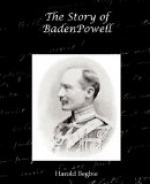CHAPTER II
THE FAMILY
Baden-Powell had certain advantages in birth. We will not violently uproot the family tree, nor will we go trudging over the broad acres of early progenitors. I refer to the fact that his father was a clergyman. To be a parson’s son is the natural beginning of an adventurous career; and, if we owe no greater debt to the Church of our fathers, there is always this argument in favour of the Establishment, that most of the men who have done something for our Empire have first opened eyes on this planet in some sleepy old rectory where roses bloom and rooks are blown about the sky.
[Illustration: Professor Baden Powell.
From a Painting by Hartmann.]
Mr. Baden-Powell, the father of our hero, was a man of great powers. He was a renowned professor at Oxford, celebrated for his attainments in theology and in physical science. But the peace-loving man of letters died ere his boys had grown to youth, and, alas, the memory of him is blurred and indistinct in their minds. They remember a quiet, soft-voiced, tender-hearted man who was tall and of goodly frame, yet had the scholar’s air, about whose knees they would cluster and hear enchanting tales, the plots of which have long since got tangled in the red tape of life. He had, what all fathers should surely have, a great love of natural history, and on his country walks would beguile his boys with talk of animals, birds, and flowers, implanting in their minds a love of the open and a study of field geology which has since stood them in excellent stead. I like to picture this learned professor, who was attacked by the narrow-minded Hebraists of his day for showing, as one obituary notice remarked, that the progress of modern scientific discovery, although necessitating modifications in many of the still prevailing ideas with which the Christian religion became encrusted in the times of ignorance and superstition, is in no way incompatible with a sincere and practical acceptance of its great and fundamental truths,—I like, I say, to picture this Oxford professor on one of his walks bending over pebbles, birds’ eggs, and plants, with a troop of bright-eyed boys at his side. One begins to think of the scent of the hedgerow, the shimmering gossamer on the sweet meadows, the song of the invisible lark, the goodly savour of the rich earth, and then to the mind’s eye, in the midst of it all, there springs the picture of the genial parson, tall and spare, surrounded by his olive-branches, and perhaps with our hero, as one of the late shoots, riding triumphant on his shoulder. It was his habit, too, when composing profound papers to read before the Royal Society, to let his children amuse themselves in his book-lined study, and who cannot see the beaming face turned often from the written sheets to look lovingly on his happy children? But, as I say, the memory of this lovable man is blurred for his children, and the clearest of their early memories are associated with their mother, into whose hands their training came while our hero was still in frocks.




